MITCHELL, S.D. (MITCHELLNOW) Native Americans in South Dakota and across the U-S are entitled to free healthcare. But K-F-F Health News reports a program meant to fill gaps in the system has its own problems. The Indian Health Service funds clinics and hospitals throughout the country for Native Americans to receive care. When that isn’t possible, the agency’s “Purchased/Referred Care” program pays outside providers for medical services in limited delivery areas. But many struggle to access them. Jonni Kroll of the Little Shell Tribe of Chippewa Indians of Montana lives 400 miles from her tribe’s headquarters, a distance that disqualifies her. Kroll, a breast cancer survivor, worries about her lack of access.
“They say, ‘You can receive direct care at any IHS facility.’ Okay, well, what if I’m in an emergency and I’ve got to be transported somewhere else?”
Congress budgeted nearly 7-billion dollars for the I-H-S this year, but a recent agency report says it will need nine times that amount – or 63 billion – to cover patients’ needs in 2026, including 10 billion for referred care.
In 2022, referred-care programs denied or deferred nearly 552-million dollars of care for about 120-thousand eligible patients. Connie Brushbreaker, a member of the Rosebud Sioux Tribe, says she’s been denied funding or been waitlisted at least 14 times since 2018. She injured her shoulder two years ago.
“I got to the point again where my husband was putting my hair up. Even getting dressed, I can’t wear sports bras because I can’t lift my arm.”
Brushbreaker was finally approved for funding and had surgery this July, two years after her injury and four months after her referral. The I-H-S is studying the possibility of statewide eligibility in the Dakotas.


